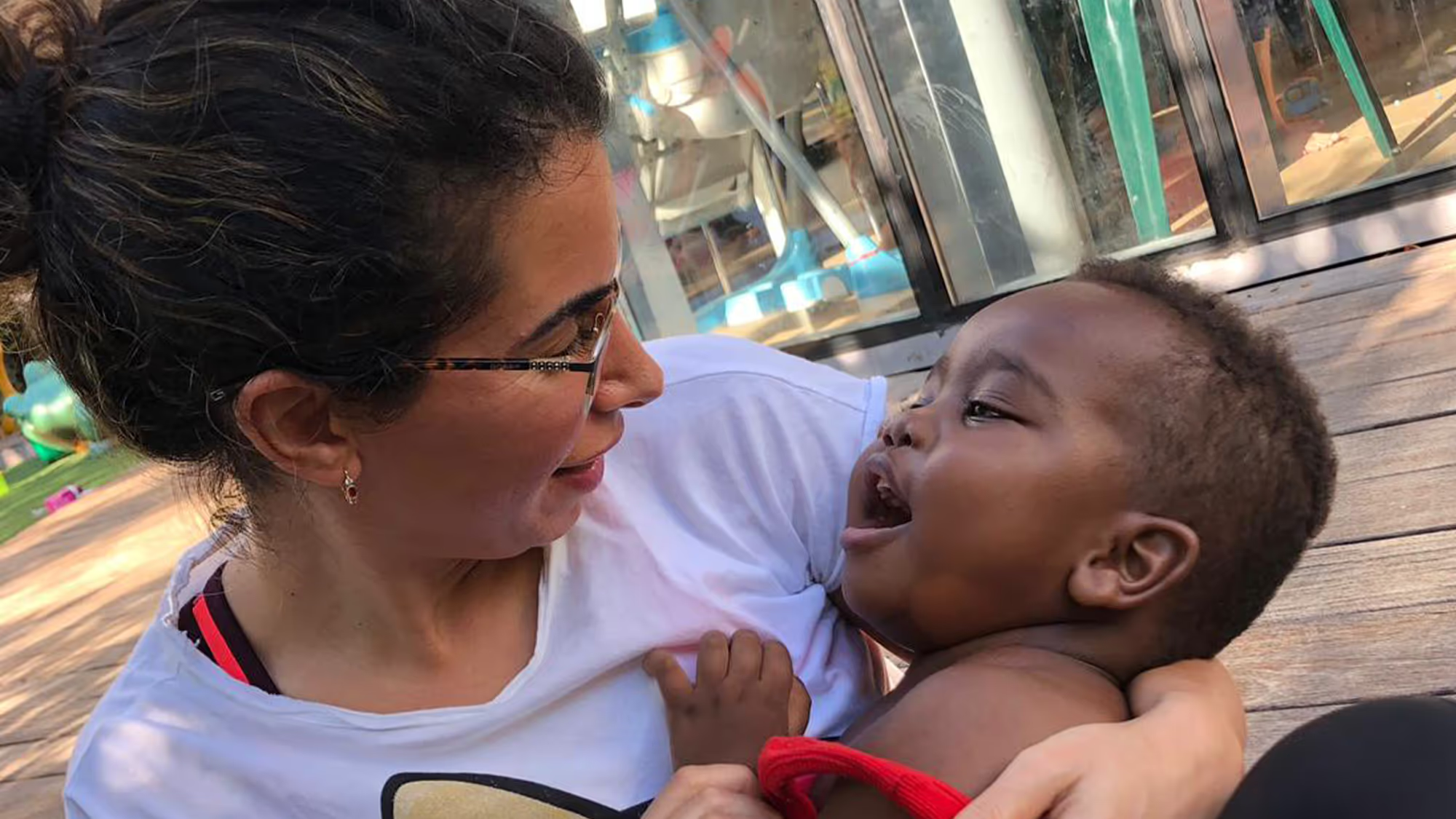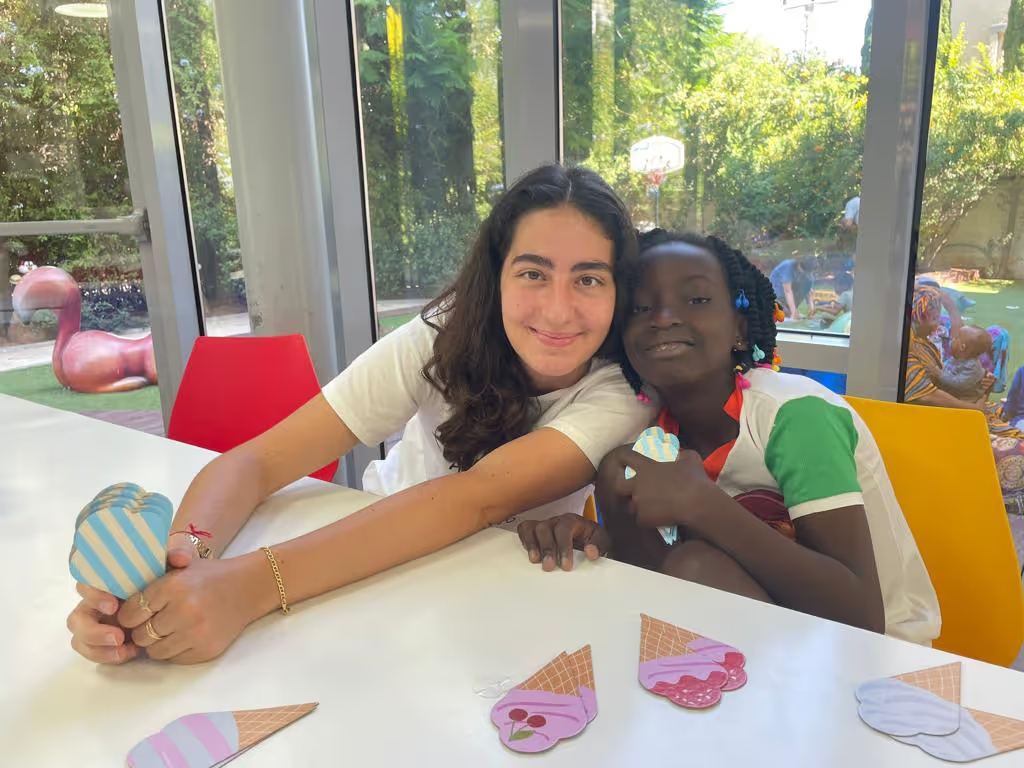If someone had mentioned the word “awe” to me a few years ago, I would immediately imagine a person looking above. I would also imagine a breathtaking scene. Maybe a cliff overlooking the ocean, when the sun warms your face and the wind spreads voices of seagulls and waves. Or maybe a view of the desert sky. When the blue light turns into darkness and one is finally able to see things as they really are.
But now, when I hear the word “awe,” a completely different picture comes to mind. It’s a humble picture, an image that captures a unique kind of awe. A moment that not only takes your breath away but also brings it back, different from what it was. It’s easy to miss this moment if you keep your head to the sky or if you try to look somewhere far away. I’ve learned it’s much better to narrow your view and genuinely pay attention to what is right in front of you. In my moment, there were two things in front of me - children with heart disease and their moms.

All of the children at SACH house in Holon have heart disease. Most children come from Africa; some come from other places in the world like Iraq or Uzbekistan. Their ages go from 3 months to 16 years old. While they all have heart disease, each child has his unique character, his one-of-a-kind soul. One can hug you the minute you first meet as if you were both best friends that haven’t seen each other for a long time. Another might watch you play with others before he lightly touches your shoulder and points at the basketball in his hand. I’ve met hundreds of children in the past two years at SACH house, and eventually, all of them reached out to me. Most of the time, it happened without words. A few of them even lay in my arms and looked me deep in the eyes for a few minutes, as if it was the most natural thing to do when getting to know someone. That was when I truly wondered “who is helping who in this house?”. When those happy eyes looked at me, I felt as if they saw something good in me that no one else noticed before, not even me.
This pure love is not the only thing these children bring to the house. Luckily, they also come with those who teach them how to love - their moms. I can only imagine how it feels to live in a developing country, let alone as a woman, especially as a mom of a child with heart disease. You may think these conditions would make a person bitter, but these women have such a positive spirit, much more than most people I’ve met. And they maintain their spirit while traveling thousands of miles to a foreign country. A country where they know nobody, they don’t speak the language, and they spend their time in and out of the hospital with their children. Even for the most optimistic person, this is not an easy task.
.jpeg)
One day I came to SACH house to start my weekly afternoon shift. As I opened the wooden gate, I saw that the place was more vibrant than usual. Sounds of African music played in the background, and a few of the mommies were singing to it as they started making dinner in the kitchen. Many children were running around the house while others were playing in groups with volunteers. I was holding one of the younger children when I noticed a woman sitting in the corner. I knew she was new to the house because I hadn't seen her before. She had a headband hiding some of her hair, a woolen sweater fully buttoned, and a long skirt that showed only a little of her pale legs. She laid her hands on her lap, and her eyes were following a 14-year-old who was walking curiously around the house. She didn’t notice me until I stood right in front of her, trying to introduce myself. I soon realized she didn’t speak a word of English, so all I could do was to point at the young boy and then give a thumbs up. It was my way to let her know that he will be ok, that he is safe here, and so is she. For barely a few seconds, she looked at me with a closed smile while slightly nodding her head. I wasn’t sure if she was thanking me or apologizing for something, but before I could figure it out, she looked away, and her closed smile was gone.
I later discovered her name was Ghumchagol, and she came with her son from Tajikistan. They were the only ones in the house from that area, while all the other groups were from different countries in Africa. It was probably the first time Ghumchagol had left her country, perhaps even her village, and now she was staying with her son in a home where they couldn’t communicate with anyone. Sure, Ghumchagol had a translator’s service over the phone to help her at any time, but this was still a challenging situation for her. I remember hearing about how long it took to pick up Ghumchagol and her son from the airport. Deborah, a nurse from Rwanda, was the one who drove there. When she greeted them, they smiled back but then kept standing where they were, refusing strongly to go with her.
I came to the house the following week, hoping things would be a bit better. I was searching for Ghumchagol and soon saw her standing in the kitchen, cooking by herself. Her eyes glanced at her son from time to time, but she looked a bit more relaxed. I waved and smiled at her. She smiled back, nodding her head again. I spent most of that shift and the one after playing with her son. When the shift was over, and I said my usual long goodnight to everyone. I remember seeing Ghumchagol preparing the table. She put two plates on the end of the long table, at the corner, where no one was sitting. I saw her going back and forth, and even though the tables and kitchen are very close, she moved hesitantly as if measuring every step. When she finally sat down, she looked a bit restless. She watched her son while he was eating and then got up again and stood behind his chair. She straightened his shirt, stroked his hair with both hands, and kissed his red face on the cheek.
After that, I didn’t see Ghumchagol or her son for 2 - 3 weeks, as my shifts coincided with their hospital visits. And so, one day, I came to the house to have my weekly afternoon shift. This time there were not many children running around. Few of the groups had left the house, and most children were having their afternoon nap upstairs. Still, I heard this loud sound of laughter. I entered the house. On the black couch were sitting 4 women: Deborah, the nurse from Rwanda, two moms from Zanzibar, and Ghumchagol. They were all packed together, and Ghumchagol was sitting on the armrest of the sofa, with one hand on Debora’s shoulder and the other on her stomach. Debora was telling a story. Something funny had happened in the kitchen the previous night. She was trying to finish a sentence but was interrupted by a laugh that went quickly up and ended rolling all over the place. It was Ghumchagol’s laugh. Her face was shining, and she was jumping in every few seconds, eager to express herself, trying to say some new words. “Yes, water!” “Mommy Ayesha, Mommy Ayesha!” “Floor.” Each time Ghumchagol was saying something, she choked with laughter, and the three women followed suit. At some point, one of them got up and hugged Ghumchagol from the side while Ghumchagol wrapped her hand around her. It was then that Ghumchagol noticed me standing there. She raised her head and then her hand, waving for me to join them. It was a simple gesture, but somehow, I felt incredibly grateful. Deborah quickly made a space for me on the sofa next to her. As I sat down, she started telling me the story from the beginning. While I listened to her, I glanced around the house. I saw the mommies from Ethiopia and Zanzibar cooking together in the kitchen. I saw a few children coloring in English books. I saw Dr. Ami Cohen’s medals and pictures on the wall. And then I saw Ghumchagol. She was looking at me and nodding her head again, but this time it was different. She gave sharp and lively movements. She was smiling, and her eyes were wide open as if she were asking me if I understood what Deborah was saying, if I understood what happened. I looked at her, and while I slowly took air into my body again, I smiled and nodded my head.
Ghumchagol and her son left the house about a month later. This time, they couldn’t stop crying and hugging everyone when it was time for them to go to the airport. If you ask me, this is what SACH is all about – bringing hearts closer. Some, so they can be saved and healed. Others, so they can truly be seen, and therefore, be changed.


